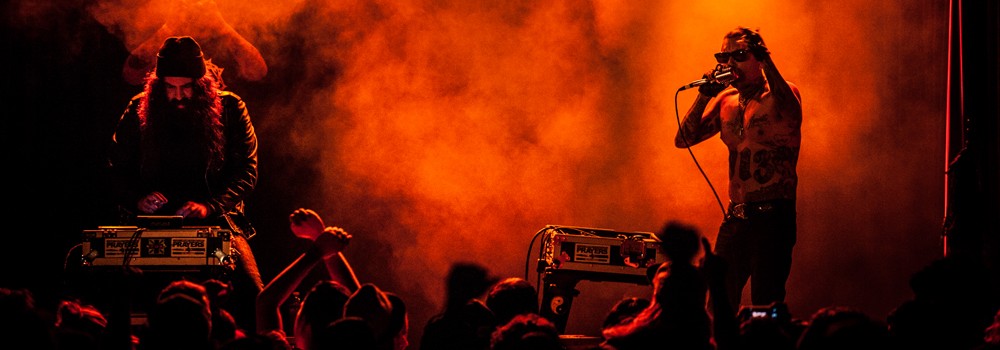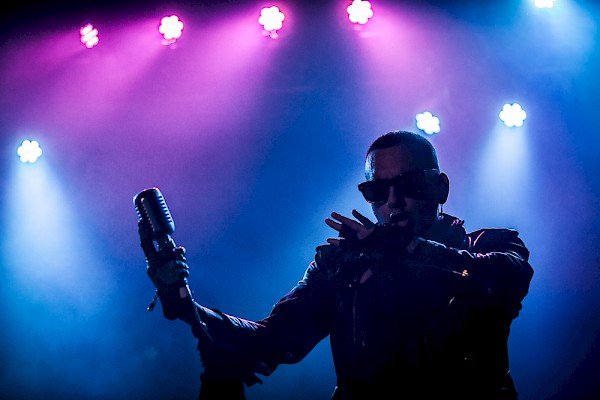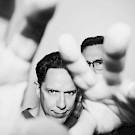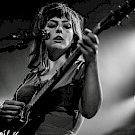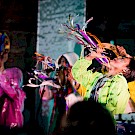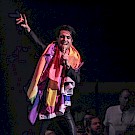At first glance, Leafar Seyer and Dave Parley are an intimidating pair. Seyer, aka Rafael Reyes (try spelling his name backwards), is a tightly packaged, muscle-bound bomb of a man who’s brimming with energy and covered in tattoos, black nail polish and an ever-present pair of jet black sunglasses. Parley exudes a silent intensity, hulking over Seyer in an unnecessary amount of ebony coat layers, with frizzy, waist-length hair, a huge beard, and sharply contrasting, coke-white high-top sneakers. Together they are Prayers, a self-described “Cholo goth” band hailing from San Diego who formed in 2013.
Seyer is the voice of the group, singing in an anguished half-scream that slices through the air like the oft referred to switchblades peppered throughout his lyrics. A lifelong gangbanger, and a member of the Sherman Grant Hill Park 27 gang, Seyer has almost completely shifted his aggression and dangerous lifestyle towards his art. Already teetering on the edge of serving life under California’s ridiculous three-strikes law, music and success in his creative expression seems to have found him at the perfect time. Parley, a bit more of a mystery (which is fitting), heads up the production duties for the group, providing a rich soundscape of hard-hitting, electro-synth arrangements that serve almost as a metaphorical voice for his quiet persona.
In the two years since their formation, Prayers have put out two EPs and an album (SD Killwave). They burst onto the scene with Gothic Summer, a five-track assortment of catchy bangers containing the fan-favorite title cut and the equally recognizable ode to morbidity “Only Death Can Set Me Free.” Themes of loneliness, paranoia and biographical narratives interweave with snappily ominous compositions, reflecting a diverse history of new wave, electronic and industrial influences that span the past four decades. With comparisons to Joy Division, Nine Inch Nails, Pet Shop Boys, Depeche Mode, Mindless Self Indulgence, Ghostland Observatory and Crystal Castles, Prayers remains its own beast, and is one of the most refreshingly unique groups to come out in the past 20 years.
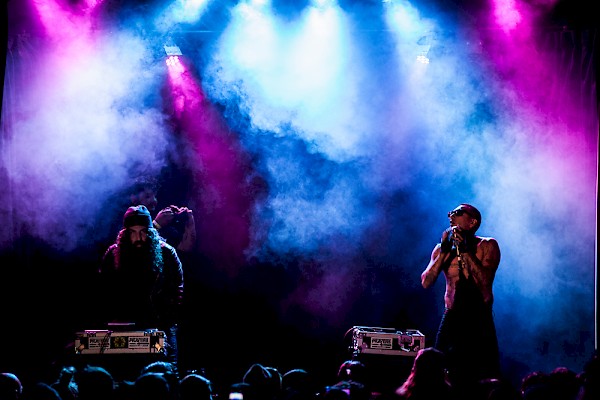 Prayers at the Star Theater—click to see more photos by Sam Gehrke
Prayers at the Star Theater—click to see more photos by Sam Gehrke
Part of this has to do with the moniker pioneered by the duo: Cholo goth is not a term you hear every day, and the definition sparks immediate interest during every conversation I’ve had about them. Seyer and Parley, both immigrants, are genuine products of Cholo culture, but are also just as much legitimate spawn of the goth movement. It isn’t a gimmick used to garner listeners, and the music could easily stand on its own without the undeniable aesthetic appeal that Seyer has coated his creation in.
After the release of Gothic Summer in 2014, the pair hooked up with Blink-182 and Transplants drummer Travis Barker to put together their latest EP Young Gods, which came out on June 23. They kicked off their Young Gods Tour in promotion of the EP at the Star Theater on Sunday, August 23, the final night of MusicfestNW.
Portland seems like an odd choice for a band like Prayers to start a national tour, but just as with any good David Lynch film, if you look a little closer you can always find a darker side to your surroundings. PDX has a massive pocket of goth subculture, evidenced by bars like The Lovecraft and numerous evening events catering to the demographic. With this little tidbit of knowledge in mind, Prayers turned out to be the perfect fit for the Star Theater, drawing a huge audience that squeezed into the venue’s thin, corridor-style space on a Sunday night.
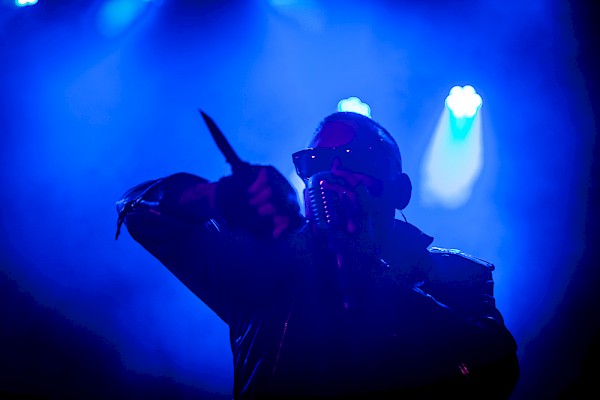 Click to see more photos of Prayers at the Star Theater by Sam Gehrke
Click to see more photos of Prayers at the Star Theater by Sam Gehrke
After a dreamy performance by Force Publique, Prayers took the stage, Seyer walking tall with a forceful gate and Parley trudging behind him, shoulders hunched forward, almost as if in anticipation of the MPC5000 to be placed in front of him. The theater darkened and Parley kicked into gear, triggering a wave of white noise that rippled through the audience. The first beat ignited a quick flash of strobes that were trapped in the smoke hanging in the air. Seyer grasped a retro-style microphone with his gloved hands, uttering a few choice, cryptic lines before launching into the set, starting with “Blood On The Blade,” and causing the crowd to go wild. It was surprising to me exactly how entertaining such a basic setup of a MPC and microphone paired with passionate delivery and inventive theatrics could be. At times Seyer would whip out a knife, opening and closing the blade while physically mimicking his lyrics before throwing the mic forward and whipping it back with a black scarf that was tied around the stand. The formula of the performance was spectacular in its simplicity, and one of the most captivating I’ve seen in years.
Other highlights of the show included Prayers’ first live performance of “West End Girls” (watch the video below), which was as dialed in as if they had been playing it to crowds for years. I can’t begin to explain the kind of feeling you get seeing the beginnings of something that has every right to skyrocket into the stratosphere on both a cultural and musical level. Every movement, every lyric and punched in beat sound and feel that much more special when you know that the band is sharing it with you for the very first time. Judging by the way Seyer and Parley completely devoted themselves to their art and their audience, I wouldn’t be at all surprised if the feeling between fan and performer is reiterated with the same level of passion in every subsequent show of the tour.
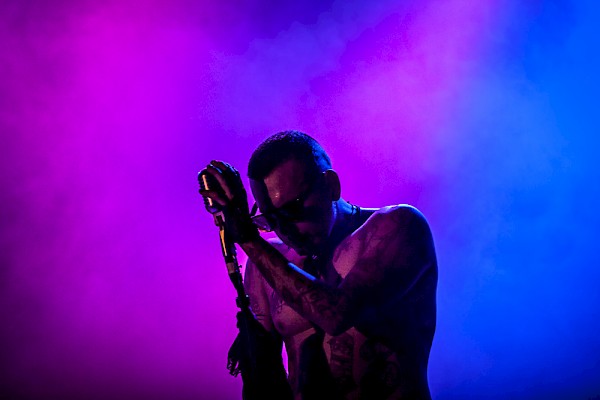 Click to see more photos of Prayers at the Star Theater by Sam Gehrke
Click to see more photos of Prayers at the Star Theater by Sam Gehrke
As their set went out with a resounding bang, Prayers jumped off the stage, sparing no time to exchange words of love and respect with their fans. Seyer doled out massive bear hugs, hanging off audience members for pictures and expressing startlingly genuine words of gratitude to everyone surrounding him. Parley was just as personable, but in his own low-key way: nodding to admirers, striking good-natured poses with fans, and smiling underneath his shaggy beard.
The stark contrast between Prayers’ stage persona and their willingness to engage in human interaction was one of the best parts of the night. Both gave truth to the old adage “never judge a book by its cover." I feel slightly odd saying it, but the unspoken acknowledgment of brotherhood exhibited by someone whom you hold an almost idyllic view of because of their talent, demeanor, aesthetic look or history, is one of the most reassuring and empowering feelings in the world. The show was just as creatively stimulating as it was entertaining, and by the end of the night, both artists and audience parted ways with a sense of perfomative and participative fulfillment.

